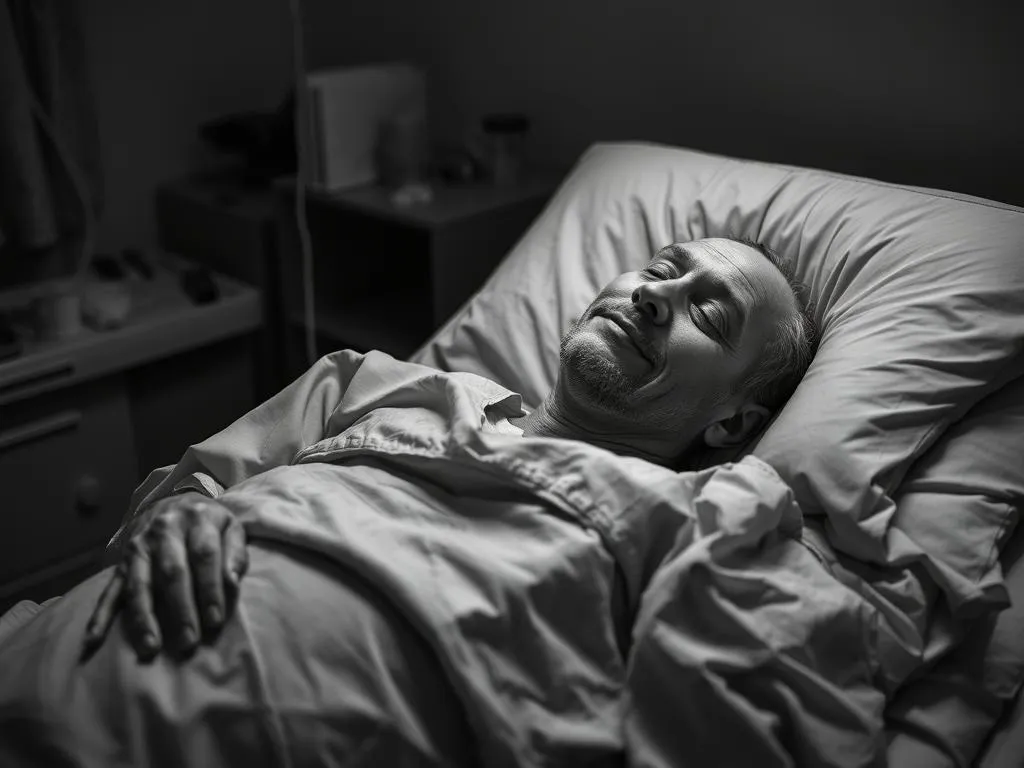Dying of Cancer Dream Meaning: Uncovering the Symbolic Significance

Introduction
Dreams can be a powerful window into our subconconscious, often reflecting our deepest fears, anxieties, and desires. One common dream theme that many people experience is the ‘dying of cancer dream’. While the thought of such a dream can be unsettling, understanding its symbolic meaning can provide valuable insight into our own emotional and psychological states.
In this blog post, we’ll explore the ‘dying of cancer dream meaning’ and uncover the potential interpretations behind this powerful dream imagery. By delving into the symbolic significance, we can gain a better understanding of how our subconconscious mind processes our thoughts and feelings about mortality, illness, and personal growth.
Exploring the Symbolic Meaning of ‘Dying of Cancer Dream’
The ‘dying of cancer dream’ is a dream scenario that many people report experiencing. While the specifics of the dream may vary, the central theme often involves the dreamer facing a terminal cancer diagnosis and the subsequent process of dying. This type of dream can be deeply unsettling, as it confronts us with our own mortality and the fragility of life.
However, it’s important to note that the ‘dying of cancer dream meaning’ is not necessarily a literal prediction of the dreamer’s future health. Instead, this dream is often a symbolic representation of deeper emotional or psychological issues that the dreamer is grappling with.
Potential Interpretations of the ‘Dying of Cancer Dream’
-
Confronting Mortality: The ‘dying of cancer dream’ may represent the dreamer’s subconconscious fear of death or their own mortality. This dream can be a way for the mind to process and come to terms with the inevitability of death, which can be a deeply unsettling and anxiety-provoking topic for many people.
-
Emotional Turmoil: The ‘dying of cancer dream’ may also be a symbolic representation of the dreamer’s emotional or psychological state. The dream may be reflecting feelings of inner turmoil, such as grief, loss, or a sense of personal crisis. The cancer diagnosis in the dream can be a metaphor for the dreamer’s own emotional or mental “illness” that they are struggling to overcome.
-
Personal Growth and Transformation: Interestingly, the ‘dying of cancer dream’ can also be a sign of personal growth and transformation. The dream may represent the dreamer’s subconconscious desire to “let go” of old patterns, beliefs, or aspects of their identity that are no longer serving them. The “death” of the cancer diagnosis in the dream may symbolize the dreamer’s readiness to embrace a new phase of their life, one that involves personal growth and evolution.
-
Unresolved Conflicts or Regrets: In some cases, the ‘dying of cancer dream’ may be a reflection of unresolved conflicts, regrets, or unfinished business in the dreamer’s life. The dream may be a way for the subconconscious mind to process these issues and encourage the dreamer to address them before it’s too late.
-
Spiritual Awakening: For some individuals, the ‘dying of cancer dream’ may be a sign of a deeper spiritual awakening or a shift in their perspective on life and death. The dream may represent the dreamer’s subconconscious exploration of existential questions or their desire to find more meaning and purpose in their life.
Contextual Factors in Interpreting the ‘Dying of Cancer Dream’
It’s important to note that the interpretation of the ‘dying of cancer dream’ can vary depending on the individual’s personal circumstances, life experiences, and the specific details of the dream. When analyzing the meaning of this dream, it’s crucial to consider the following contextual factors:
-
Personal History: The dreamer’s personal history, including any experiences with cancer, illness, or loss, can significantly influence the interpretation of the ‘dying of cancer dream’.
-
Emotional State: The dreamer’s current emotional state, such as feelings of anxiety, grief, or stress, can shape the meaning and symbolism of the dream.
-
Life Challenges: Any significant life challenges or transitions the dreamer is facing, such as career changes, relationship issues, or personal growth, may be reflected in the ‘dying of cancer dream’.
-
Spiritual or Philosophical Beliefs: The dreamer’s spiritual or philosophical beliefs can also play a role in the interpretation of the ‘dying of cancer dream’, particularly if the dream is related to themes of mortality, the afterlife, or personal transformation.
By considering these contextual factors, the dreamer can gain a deeper understanding of the ‘dying of cancer dream meaning’ and how it relates to their own personal experiences and inner landscape.
Strategies for Coping with the ‘Dying of Cancer Dream’
Experiencing a ‘dying of cancer dream’ can be a deeply unsettling and emotional experience. However, there are several strategies that can help the dreamer cope with the aftermath of such a dream:
-
Reflect and Journal: Encourage the dreamer to take time to reflect on the dream and journal about their thoughts, feelings, and any insights they may have gained. This process can help the dreamer process the dream’s symbolic meaning and find a sense of closure.
-
Seek Support: Encourage the dreamer to talk to trusted friends, family members, or a mental health professional about the dream. Sharing the experience with others can help the dreamer feel less alone and provide an opportunity for further exploration and understanding.
-
Practice Mindfulness and Relaxation: Engaging in mindfulness practices, such as meditation or deep breathing exercises, can help the dreamer calm their mind and body, reducing any lingering anxiety or distress from the dream.
-
Focus on Self-Care: Encourage the dreamer to prioritize self-care activities, such as getting enough sleep, eating a balanced diet, and engaging in physical exercise. Taking care of one’s physical and emotional well-being can help the dreamer feel more grounded and resilient in the face of such a powerful dream experience.
-
Seek Professional Support: If the ‘dying of cancer dream’ is causing significant distress or disruption to the dreamer’s daily life, it may be beneficial to seek the guidance of a mental health professional, such as a therapist or counselor, who can help the dreamer process the dream and address any underlying issues.
Conclusion
The ‘dying of cancer dream meaning’ can be a complex and multifaceted topic, as these dreams can represent a wide range of emotional, psychological, and spiritual themes. By understanding the potential interpretations and the importance of considering contextual factors, dreamers can gain valuable insight into their own inner landscapes and work towards personal growth and transformation.
Remember, the ‘dying of cancer dream’ is not necessarily a literal prediction of the future, but rather a symbolic representation of the dreamer’s subconconscious thoughts, feelings, and experiences. By approaching these dreams with an open and compassionate mindset, dreamers can unlock the hidden wisdom within and use it to enhance their overall well-being and personal development.








